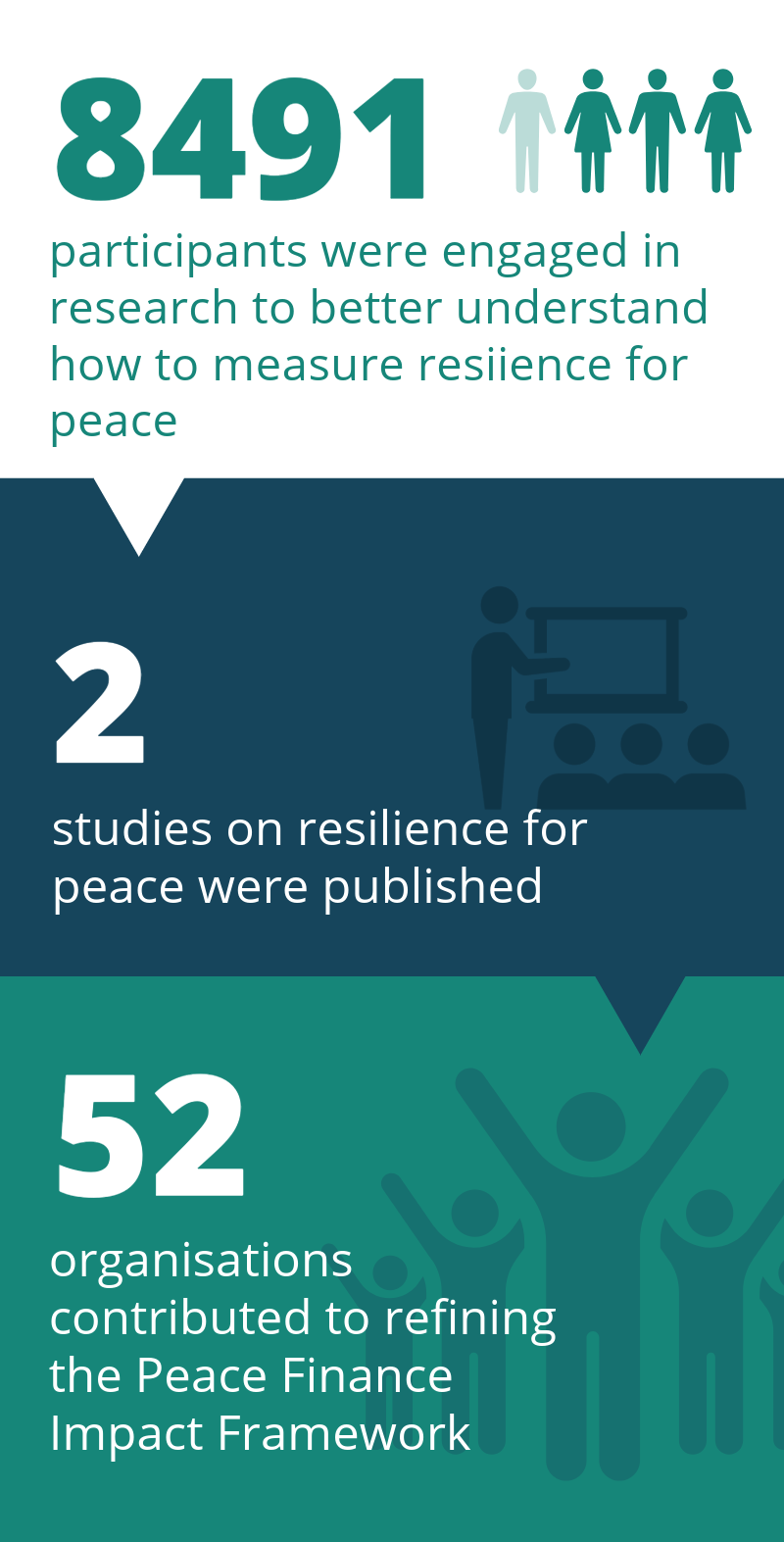Strategic aim 1:
Rethink peace


Interpeace launched the Principles for Peace in 2022, which provide a contemporary framing for better quality peace agreements and peace processes, developed through extensive consultations worldwide and now being advanced by an independent foundation and organisation with multiple stakeholders. In 2023, Interpeace focused on other dimensions of “rethinking peace”: how peace is assessed and measured, how it is built, and how it is funded.

Measuring peace: creating a barometer to underpin more effective policy responses
Ethiopia’s security situation has continued to have significant social impacts, with millions of citizens displaced, thousands killed, and economic challenges growing. The current circumstances are threatening the prospects of sustainable peace and democratic gains. In this context, the pilot Ethiopian Peace Index was launched in June 2023 in partnership with Ministry of Peace of the Federal Republic of Ethiopia, ABCON Research & Consulting and the Centre for Sustainable Peace and Democratic Development. The research was Interpeace's first attempt, since the adoption of the 2021-2025 strategy, to advance a trust, resilience and inclusion barometer. The Ethiopian Peace Index is a flexible tool which provides a quantitative evidence base that can (and should) be revisited and re-analysed as new needs and research questions arise. The Ethiopian Peace Index report provides in-depth analysis of peacefulness and conflict, food security, mental well-being, and gender equality outcomes in the regions under study.
The pilot Ethiopian Peace Index main finding is that peaceful community and intergroup relations are the most critical factors to be improved to achieve peace in Ethiopia overall. Several potential pathways to improving harmony and community peace were tested. The key factors emerging were the objectivity of local leaders when making decisions and minimising ethnic bias among traditional leaders when resolving intergroup disputes.
A community-based participatory framework for assessment of resilience in Rwanda was completed at the end of 2023. Among others, the aim was to develop and validate resilience indicators that can be used to structure future research activities, policies and programmes for community resilience in Rwanda. The foundation study for the framework adopted a mixed approach combining qualitative and quantitative methods. Data were collected at four levels: individual, household, community and institution. Some 781 people took part in the Community Resilience.
Assessment Framework study
Interpeace developed two options in 2023 for measuring resilience: one that is primarily quantitative and one that uses mixed methods and is highly participatory.
Both methods employ a multisystemic lens, measuring resilience for peace at individual, family, community, institutional and even cross-border levels. The pilot projects have confirmed the findings detailed by Interpeace in the Framework for Assessing Resilience, namely that resilience is an interconnection of factors at different levels that cut across issues related to mental health and psychosocial support, socio-economic development, governance, gender equality, education, and so on. These pilot projects have also revealed the importance not only of resilience measurement but of participatory, inclusive and collective action planning to advance priorities for strengthening resilience, which are planned as next steps.
Building peace: strengthening resilience for peace through integrated programming
In 2023, Interpeace published Attention à la paix, a guidance framework for practitioners on integrating MHPSS, peacebuilding and livelihoods into programming. Since 2015, there has been growing recognition and momentum on integrating MHPSS into peacebuilding, particularly after the Kingdom of the Netherlands’ Ministry of Foreign Affairs hosted the first conference – titled “Mind the mind” – bringing together peacebuilding and MHPSS practitioners for mutual exchange. This period coincides with the start of Interpeace’s own efforts to integrate mental health and psychosocial approaches into its peacebuilding programming in Rwanda as part of the Societal Healing and Participatory Governance programme.
In 2019/2020, Interpeace’s integration of MHPSS in its Rwanda programme was redesigned with more use and contextual adaptation of evidence-based approaches, along with more explicit integration of collaborative livelihoods. The results of this programming are documented in Attention à la paix and other reports, inspiring further examination within Interpeace as to how integrating MHPSS and livelihoods can deepen the impact of the organisation’s programming. This examination coincided with the post-COVID pandemic period, during which awareness on the importance of mental health and psychosocial well-being was heightened, including in the contexts of peace and development, going beyond the humanitarian lens.
Interpeace embarked on a research project that included an extensive literature review, consultations with experts and practitioners and case studies to test a process for collaborative design and which culminated in the Attention à la paix guidance report. The document lays out Interpeace’s theory of change on how integrating MHPSS, peacebuilding and livelihoods can create meaningful and more comprehensive change for people and contexts affected by violent conflict.